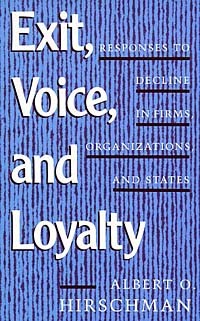Книга: Albert O. Hirschman «Exit Voice and Loyalty: Responses to Decline in Firms, Organizations, and States»

|
An innovator in contemporary thought on economic and political development looks here at decline rather than growth. Albert O. Hirschman makes a basic distinction between alternative ways of reacting to deterioration in business firms and, in general, to dissatisfaction with organizations: one,“exit,” is for the member to quit the organization or for the customer to switch to the competing product, and the other, “voice,” is for members or customers to agitate and exert influence for change "from within" . Издательство: "Harvard University Press" (1970)
ISBN: 0674276604 Купить за 979.5 руб на Озоне |
Albert O. Hirschman
Infobox Person
name = Albert O. Hirschman
image_size =
caption =
birth_date = birth date and age|1915|4|7
birth_place =
death_date =
death_place =
occupation = Economist
spouse =
parents =
children =
Albert Otto Hirschman (b.
His later work was in political economy and there he advanced two simple but intellectually powerful schemata. The first describes the three basic possible responses to
Hirschman was born in Berlin, the son of Carl and Hedwig Marcuse Hirschman. He was educated at the Sorbonne, the
When war broke out in Europe, he worked with
Following that he held a succession of academic appointments in economics at
In 2007, The
Books
* 1945. "National Power and the Structure of Foreign Trade" 1980 expanded ed., Berkeley : University of California Press
* 1955. "Colombia; highlights of a developing economy". Bogotá: Banco de la Republica Press.
* 1958. "The Strategy of Economic Development." New Haven, Conn.: Yale University Press. ISBN 0-300-00559-8
* 1961. "Latin American issues; essays and comments" New York: Twentieth Century Fund.
* 1963. "Journeys toward Progress: studies of economic policy-making in Latin America." New York: Twentieth Century Fund
* 1967. "Development Projects Observed." Washington, D.C.: The Brookings Institution
* 1970. "
* 1971. "A bias for hope : essays on development and Latin America". New Haven: Yale University Press.
* 1977. "The Passions and the Interests: Political Arguments For Capitalism Before Its Triumph". Princeton, NJ: Princeton University Press. ISBN 0-691-01598-8.
* 1980. "National power and the structure of foreign trade". Berkeley: University of California Press.
* 1981. "Essays in trespassing: economics to politics and beyond". Cambridge (Eng.); New York: Cambridge University Press.
* 1982. "Shifting involvements: private interest and public action". Princeton, N.J.: Princeton University Press.
* 1984. "Getting ahead collectively: grassroots experiences in Latin America" (with photographs by Mitchell Denburg). New York: Pergamon Press
* 1984. "Against Parsimony: Three Easy Ways of Complicating Some Categories of Economic Discourse." American Economic Review 72(2): 89-96
* 1985. "A bias for hope: essays on development and Latin America". Boulder: Westview Press.
* 1986. "Rival views of market society and other recent essays". New York: Viking.
* 1991. "
* 1995. "A propensity to self-subversion". Cambridge, Mass.: Harvard University Press.
* 1998. "Crossing boundaries: selected writings". New York: Zone Books; Cambridge, Mass.: Distributed by the MIT Press.
chema Based Articles
*
*
External links
* [http://www.nybooks.com/authors/1820 The New York Review of Books Bibliography]
* [http://www.amherst.edu/commencement/2004/honorands/hirschman.html Amherst Commencement Recognition]
* [http://www.ssrc.org/hirschman/ Albert O. Hirschman Prize and Lecture]
References
Источник: Albert O. Hirschman
Другие книги схожей тематики:
| Автор | Книга | Описание | Год | Цена | Тип книги |
|---|---|---|---|---|---|
| Albert O. Hirschman | Exit Voice and Loyalty: Responses to Decline in Firms, Organizations, and States | An innovator in contemporary thought on economic and political development looks here at decline rather than growth. Albert O. Hirschman makes a basic distinction between alternative ways of reacting… — Harvard University Press, Подробнее... | 1970 | 979.5 | бумажная книга |
См. также в других словарях:
Exit, Voice, and Loyalty — is a theoretical concept derived from the work of Albert O. Hirschman which elaborates on two essential options in organizational decline, being exit and voice.The basis concept is as follows: members of an organization, whether a business, a… … Wikipedia
Exit und Voice — (dt. etwa Abwanderung und Widerspruch) ist ein soziologisches Konzept von Albert Otto Hirschman, das zwei grundlegende Reaktionsmöglichkeiten auf Leistungsabfall von Organisationen charakterisiert: „Exit“ oder „Voice“. In der wirtschafts , sozial … Deutsch Wikipedia
Exit-Option — Exit und Voice (dt. etwa Abwanderung und Widerspruch ) ist ein soziologisches Konzept von Albert Otto Hirschman, das zwei grundlegende Reaktionsmöglichkeiten auf institutionellen Rückgang unterscheidet: „Exit“ oder „Voice“. Das Grundkonzept… … Deutsch Wikipedia
Exit (Soziologie) — Exit und Voice (dt. etwa Abwanderung und Widerspruch ) ist ein soziologisches Konzept von Albert Otto Hirschman, das zwei grundlegende Reaktionsmöglichkeiten auf institutionellen Rückgang unterscheidet: „Exit“ oder „Voice“. Das Grundkonzept… … Deutsch Wikipedia
Decline — is a change over time from previously efficient to inefficient organizational functioning, from previously rational to non rational organizational and individual decision making, from previously law abiding to law violating organizational and… … Wikipedia
United States — a republic in the N Western Hemisphere comprising 48 conterminous states, the District of Columbia, and Alaska in North America, and Hawaii in the N Pacific. 267,954,767; conterminous United States, 3,022,387 sq. mi. (7,827,982 sq. km); with… … Universalium
